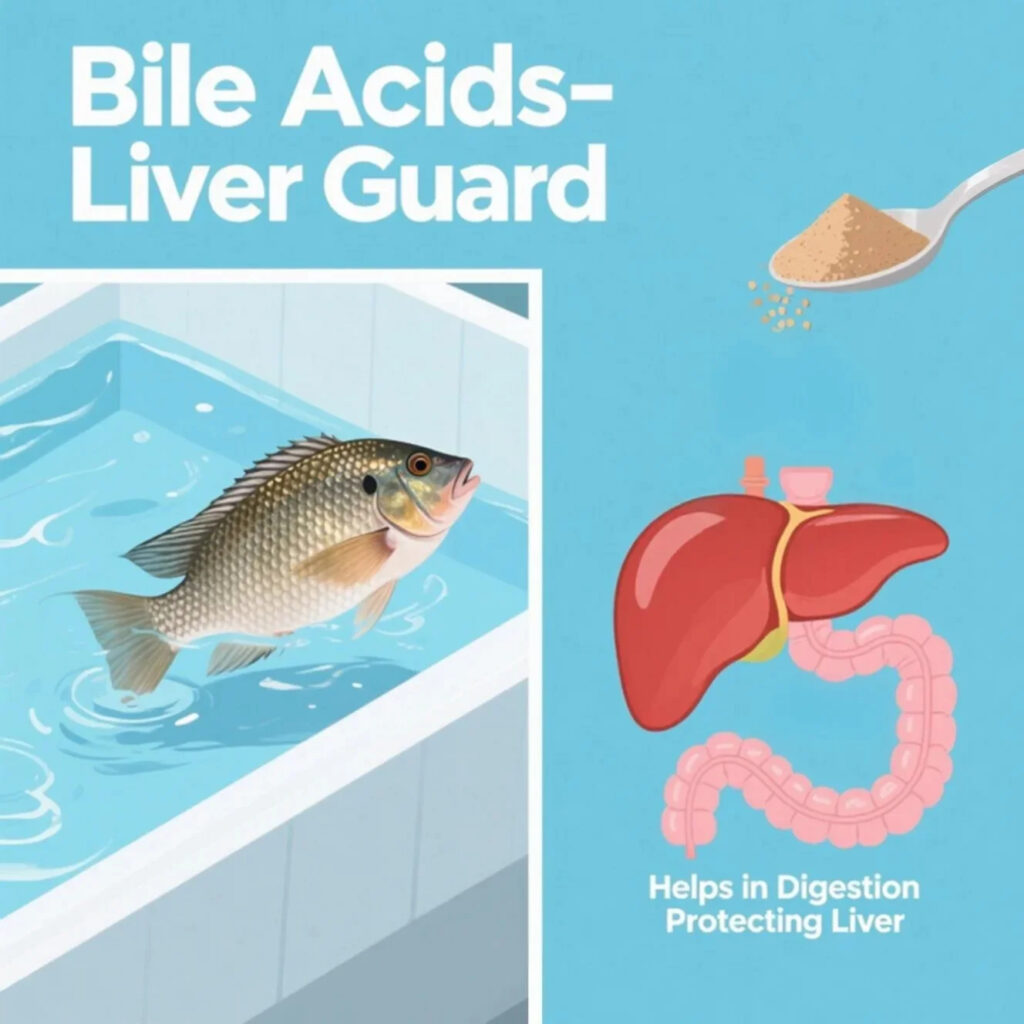Tilapia is a top fish in aquaculture. It grows fast, adapts well, and offers high nutrition. As demand rises, farmers seek ways to boost growth and health. Enter bile acids—natural compounds with big benefits for tilapia. This article shows how they help these fish thrive, from better digestion to stronger immunity.
What Are Bile Acids?
Bile acids are made in the liver from cholesterol. They store in the gallbladder and aid digestion. When tilapia eat, bile acids enter the intestine. Their job? Break down fats. They turn large fat droplets into tiny micelles. This makes it easier for enzymes to digest fats. But they do more than that. They also act as signals, controlling metabolism and immune responses. In tilapia farms, adding them to feed solves common problems like poor nutrition use and liver stress.
Better Digestion, Less Waste
Tilapia have short digestive tracts. This can limit nutrient absorption. Bile acids help here. By emulsifying fats, they increase the surface area for enzymes. This boosts absorption of fatty acids and vitamins A, D, E, K. It also cuts undigested fat in feces. Less waste means cleaner water and lower feed costs. Studies show tilapia with bile acids have higher lipid digestibility. Their feed conversion ratio (FCR) improves, too. A lower FCR means less feed per kilogram of fish. That’s good for profits and the environment.
Healthier Livers, Faster Growth
The liver is key for tilapia—detoxing, storing nutrients, and managing energy. But intensive farming stresses them. High-protein diets or poor water can harm the liver, causing fatty liver disease. Bile acids protect it. They help remove toxins and excess fat. They also activate receptors in the liver, like FXR. These regulate genes for lipid and glucose metabolism. Healthier livers mean tilapia use energy better, store less fat, and grow faster. They also handle stress better, like temperature changes or low oxygen.
Stronger Immunity, Less Disease
Diseases cost aquaculture dearly. Antibiotics are a problem, but bile acids offer a natural solution. They boost tilapia’s immunity by enhancing immune cell activity and reducing inflammation. They also strengthen the intestinal lining, blocking pathogens. Stress from crowding or transport weakens fish, but bile acids help. They lower cortisol, a stress hormone, keeping physiology stable. This cuts mortality and ensures steady growth. Stressed fish have lower muscle quality, but bile acids help maintain good flesh density and nutrition.
Sustainable and Profitable
Using bile acids fits with sustainable farming. Better feed efficiency means less waste in water, fighting eutrophication. Healthier fish need fewer chemicals, protecting ecosystems. Economically, the investment pays off. Lower feed use, less mortality, and higher yields save money. As consumers want safe, sustainable seafood, farms using bile acids gain an edge. They produce healthier tilapia with better nutrition, meeting market demands.
Conclusion
Bile acids are vital for tilapia farming. They improve digestion, protect livers, boost immunity, and support sustainability. They offer a natural, effective way to tackle farming challenges. Whether you run a small farm or a large one, adding bile acids can unlock tilapia’s full potential. Healthier fish mean better profits and a greener industry. As research grows, bile acids are set to become a standard in tilapia aquaculture—good for fish, farmers, and the planet.

